English 549: Issues in Literature: Cli Fi
advertisement
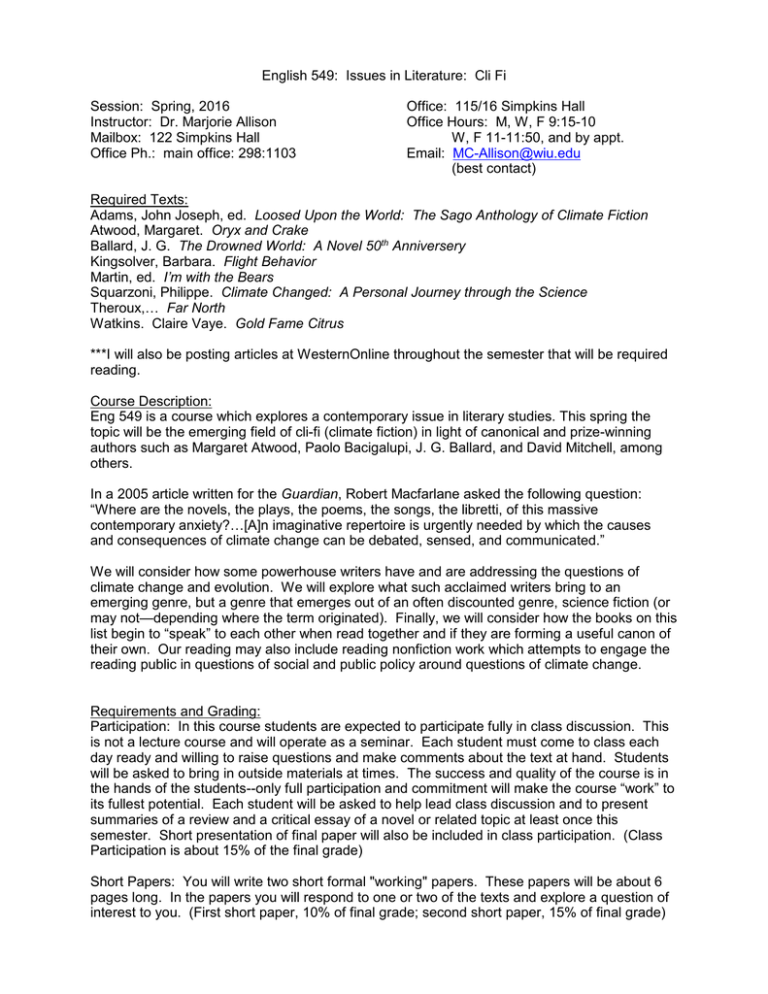
English 549: Issues in Literature: Cli Fi Session: Spring, 2016 Instructor: Dr. Marjorie Allison Mailbox: 122 Simpkins Hall Office Ph.: main office: 298:1103 Office: 115/16 Simpkins Hall Office Hours: M, W, F 9:15-10 W, F 11-11:50, and by appt. Email: MC-Allison@wiu.edu (best contact) Required Texts: Adams, John Joseph, ed. Loosed Upon the World: The Sago Anthology of Climate Fiction Atwood, Margaret. Oryx and Crake Ballard, J. G. The Drowned World: A Novel 50th Anniversery Kingsolver, Barbara. Flight Behavior Martin, ed. I’m with the Bears Squarzoni, Philippe. Climate Changed: A Personal Journey through the Science Theroux,… Far North Watkins. Claire Vaye. Gold Fame Citrus ***I will also be posting articles at WesternOnline throughout the semester that will be required reading. Course Description: Eng 549 is a course which explores a contemporary issue in literary studies. This spring the topic will be the emerging field of cli-fi (climate fiction) in light of canonical and prize-winning authors such as Margaret Atwood, Paolo Bacigalupi, J. G. Ballard, and David Mitchell, among others. In a 2005 article written for the Guardian, Robert Macfarlane asked the following question: “Where are the novels, the plays, the poems, the songs, the libretti, of this massive contemporary anxiety?…[A]n imaginative repertoire is urgently needed by which the causes and consequences of climate change can be debated, sensed, and communicated.” We will consider how some powerhouse writers have and are addressing the questions of climate change and evolution. We will explore what such acclaimed writers bring to an emerging genre, but a genre that emerges out of an often discounted genre, science fiction (or may not—depending where the term originated). Finally, we will consider how the books on this list begin to “speak” to each other when read together and if they are forming a useful canon of their own. Our reading may also include reading nonfiction work which attempts to engage the reading public in questions of social and public policy around questions of climate change. Requirements and Grading: Participation: In this course students are expected to participate fully in class discussion. This is not a lecture course and will operate as a seminar. Each student must come to class each day ready and willing to raise questions and make comments about the text at hand. Students will be asked to bring in outside materials at times. The success and quality of the course is in the hands of the students--only full participation and commitment will make the course “work” to its fullest potential. Each student will be asked to help lead class discussion and to present summaries of a review and a critical essay of a novel or related topic at least once this semester. Short presentation of final paper will also be included in class participation. (Class Participation is about 15% of the final grade) Short Papers: You will write two short formal "working" papers. These papers will be about 6 pages long. In the papers you will respond to one or two of the texts and explore a question of interest to you. (First short paper, 10% of final grade; second short paper, 15% of final grade) Online Discussion: You will be required to participate in an online discussion of course materials throughout the semester. Minimums will be: one original post per week, two responses to other students’ posts per week. (Online Discussion is about 10% of the final grade) Annotated Bibliography: You will turn in an annotated bibliography citing a minimum of eight sources: two of which must be reviews and two of which must be critical essays of the text you choose to work with in your final, long paper. You must also annotate two additional sources for the text you work with in your class presentation (one review, one critical essay). (Annotated Bibliography is about 15% of the final grade) Long Paper: You will write one long, 12-15 page, analytical essay about one or more of the texts we have read for the semester. You must incorporate secondary sources for this paper. More details to follow. (Long paper is about 35% of the final grade) General Information --Participation, Attendance and Punctuality: Because this course is based upon class discussion, attendance and participation are crucial to the success of the course and the success of individual students in the course. In order to participate you must not only attend class but also arrive on time. If you are absent, it is up to you to find out from classmates what material you have missed and to find out what you need to do for the next class session. Any student who falls into a pattern of absenteeism will find his or her final grade adversely effected; persistent lateness will have a similar effect. Each student is allowed two absences for the semester--no questions asked. For each absence beyond two, I will deduct one grade from your final grade for Class Participation. A pattern of chronic absences will result in the final, overall grade being lowered. --Conduct: I expect my classes operate with great respect for a large diversity of ideas and viewpoints. This atmosphere is essential in any academic setting. I expect all students to respect and listen to other viewpoints—I do not expect all students to agree on issues. So, mature, respectful, and thoughtful dialogue is encouraged. Insensitive comments and conduct will not be tolerated, whether aimed at me or at a class member. Please see the Code of Student Conduct: http://www.wiu.edu/policies/stucode.shtml. --Papers will be submitted both electronically and in hard copy and may be returned electronically. -- Grades on late papers will be lowered half of a grade for each day late unless you have made special arrangements with me before the due date.--I reserve the right to not write comments on late papers. --Grading is done in accordance with college guidelines and are earned according to the following standard: 100-93 = A 92-90 = A89-87 = B+ 86-83 = B 82-80 = B79-77 = C+ 76-73 = C 72-70 = C69-67 = D+ 66-63 = D 62-60 = D59 and below = F --See the college handbook for more information on grading and on scholastic dishonesty (HONEST WORK IS EXPECTED, I cannot say this strongly enough. Plagiarism will be reported to CAGAS). --All assignments must be completed in order to pass the course. --Please turn off your cellphone ringer when in class, and please refrain from texting during class. --A final note--you are urged to keep an extra copy of your papers and of any other important work. If you work at a computer, make a physical backup of your working disk--backup the disk, don’t just backup the files. Reading Schedule (This schedule and list is subject to change according to the needs of the class. All changes will be announced in class, and it is up to you to keep informed about any changes.) 1/25 Class Introduction: Climate Changed 2/1 Ballard-The Drowned World and articles 2/8 Begin Theroux- Far North, stories and articles 2/15 Finish Far North, stories and articles 2/22 Begin Kingsolver-Flight Behavior, stories and articles 2/29 Finish Flight Behavior, stories and articles, FIRST SHORT PAPER DUE 3/7 I’m with the Bears and articles 3/14 SPRING BREAK 3/21 Begin Atwood- Oryx and Crake, stories and articles 3/28 Finsh Oryx and Crake, stories and articles; SECOND SHORT PAPER DUE 4/4 Begin Watkins-Gold Fame Citrus, stories and articles 4/11 Finish Gold Fame Citrus, stories and articles 4/18 TBD; Annotated Bib Due 4/25 TBD 5/2 TBD, Final Paper Due Final Meeting: 5/9 For the class to decide: Clara Hume’s Back to the Garden or Nathaniel Rich’s Odds Against Tomorrow
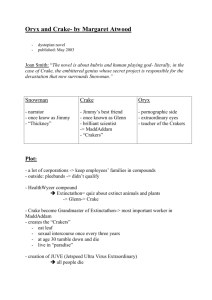

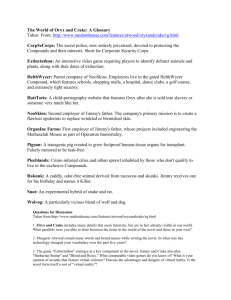
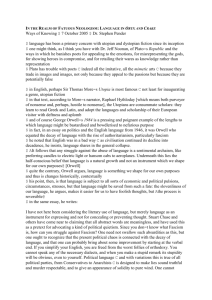

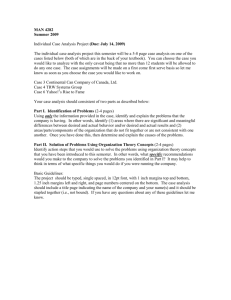
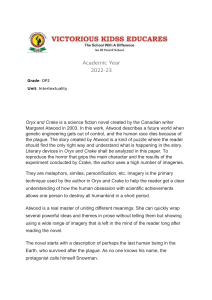
![[2012] Simpkins JW . An N-](http://s2.studylib.net/store/data/013983496_1-ccad4b02cbe549a237647fda81076028-300x300.png)